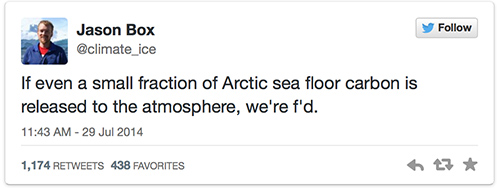Above – reposting, first Greenland 2014 piece from last week.
After unpacking a few clean clothes, grabbing long showers, and sharing a few moderate adult beverages, Jason Box and I eased back into the media sphere, after almost 2 weeks on the Greenland sheet. Robin Williams was dead. That hit us both at the same time. I checked email. Jason checked twitter. And took on a startled look.
An unusually blunt statement from usually soft spoken Box had gone viral. [In my experience, when scientists start swearing, they are really feeling the import of what is going on.]
Brian Merchant had a piece on Motherboard, here’s part of it:
This week, scientists made a disturbing discovery in the Arctic Ocean: They saw “vast methane plumes escaping from the seafloor,” as the Stockholm University put it in a release disclosing the observations. The plume of methane—a potent greenhouse gas that traps heat more powerfully than carbon dioxide, the chief driver of climate change—was unsettling to the scientists.
But it was even more unnerving to Dr. Jason Box, a widely published climatologist who had been following the expedition. As I was digging into the new development, I stumbled upon his tweet, which, coming from a scientist, was downright chilling:

Box, who is currently a professor of glaciology at the Geological Survey of Denmark and Greenland, has been studying the Arctic for decades. His accolade-packed Wikipedia page notes that he’s made some 20 expeditions to the Arctic since 1994, and served as the lead author on the Greenland section of NOAA’s State of the Climate report from 2008-2012. He also runs the Dark Snow project and writes about the latest findings in the field at his blog, Meltfactor.
In other words, Box knows the Arctic, and he knows climate change—and the methane plumes had him blitzed enough to bring out the F bombs.
Now, the scientists in the Arctic didn’t fully understand why the plumes were occurring. But they speculated that a warmer “tongue” of ocean current was destabilizing methane hydrates on the Arctic slope.
I called the scientist at his office in Copenhagen, and he talked frankly and emphatically about the new threat, and about the specter of climate change in general. He also swore like a sailor, which I’ve often wondered how climatologists refrain from doing, given the urgency of the problem—it’s certainly an entirely accurate way to communicate the climate plight.
Salon had a piece. Jason’s twitter feed had more than tripled. His interview with Bill Maher was online.
Jason’s wife called. A Hungarian acquaintance had told her that Jason was front page news in Budapest.
The ice in Greenland this year isn’t just a little dark—it’s record-setting dark. Box says he’s never seen anything like it. I spoke to Box by phone earlier this month, just days after he returned from his summer field research campaign.
“I was just stunned, really,” Box told me.
The photos he took this summer in Greenland are frightening. But their implications are even more so. Just like black cars are hotter to the touch than white ones on sunny summer days, dark ice melts much more quickly.
As a member of the Geological Survey of Denmark and Greenland, Box travels to Greenland from his home in Copenhagen to track down the source of the soot that’s speeding up the glaciers’ disappearance. He aptly calls his crowdfunded scientific survey Dark Snow.
There are several potential explanations for what’s going on here. The most likely is that some combination of increasingly infrequent summer snowstorms, wind-blown dust, microbial activity, and forest fire soot led to this year’s exceptionally dark ice. A more ominous possibility is that what we’re seeing is the start of a cascading feedback loop tied to global warming. Box mentions this summer’s mysterious Siberian holes and offshore methane bubbles as evidence that the Arctic can quickly change in unpredictable ways.
This year, Greenland’s ice sheet was the darkest Box (or anyone else) has ever measured. Box gives the stunning stats: “In 2014 the ice sheet is precisely 5.6 percent darker, producing an additional absorption of energy equivalent with roughly twice the US annual electricity consumption.”
http://climatecrocks.com/2014/09/16/slate-why-greenlands-dark-snow-should-worry-you/Perhaps coincidentally, 2014 will also be the year with the highest number of forest fires ever measured in Arctic.









No comments:
Post a Comment